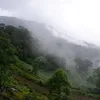Will your wind farm sail or fail? Bengaluru-based startup Wind Pioneers has the answer
Expat Jerry Randall’s startup Wind Pioneers uses automation to evaluate feasibility, selects sites that can succeed quickly on a low cost, and helps clients scale their assets.
With climate change making the adoption of renewable energy even more urgent, a Bengaluru-based startup founded by an expat is guiding clients to harness at scale one of the cheapest sources — wind energy — while avoiding the pitfalls.
Given that it often takes years to get a wind farm project off the ground and many are killed due to fundamental flaws, Jerry Randall’s startup, , evaluates the feasibility of a client’s endeavour using a high degree of automation, and thus, saves it time, money, and resources.
“We use technology to undertake feasibility studies, layout designs, and predict the energy output that a wind farm will generate in its lifetime,” says Jerry.
The company helps corporate entities build a portfolio of wind development assets by selecting sites that would be successful and then guiding them through the development cycle as quickly and efficiently as possible.
“This means identifying and dropping the sites that have fatal flaws and progressing with the ones that will succeed with minimum time and cost,” says Jerry. “Our proprietary tools ensure fast, robust analyses at a fraction of the time and effort of industry-standard approaches. We test all the risks before executing a project — be it land availability, turbine type, hub height, or increased sophistication from using automation and ensembling methodologies in a wind farm.”

Snapshot of Wind Pioneers
Wind Pioneers uses an entire stack of technologies to create, build, design and scale wind farms. Its tech tools understand how a project can be scaled, and after the company works with various vendors in the wind farm ecosystem, it helps build the ones that would be profitable for customers.
“Ultimately, we’re solving climate change and electricity access,” says Jerry. “We find and design new wind farm sites across the world, with a primary focus on emerging markets. With wind energy being the cheapest, greenest source of new electricity in most geographies, it is critical to the future health of the globe and vital for ensuring everyone has access to electricity without having the environment foot the bill.”
According to market research firm Global Market Insights, the global wind energy market was valued at over $93 billion in 2019 and is expected to grow at a compound annual growth rate of 8.4 percent from 2020 to 2026, with annual installation likely to exceed 101 GW by 2026.
The genesis
Originally from the UK, Jerry had served as a midshipman, at the Royal Navy Reserve, and later worked as an engineer with three wind energy companies — one of them a multinational entity in Bengaluru — before deciding to start up in 2016.
“I was hugely impressed with the engineering talent in the city, and after a stint in Thailand it became clear that there was an opportunity to leverage that talent to serve other emerging markets,” he says about Bengaluru.
“Wind farming is booming around the globe, and with most expertise sitting in high-cost markets such as Europe, I saw a big opportunity to serve those markets from an engineering hub.”
As the sole founder, Jerry invested $5,000 and bootstrapped the company. The first year was difficult: few trusted him.
A Thai company working on an Indonesian site was Wind Pioneers’ first client. The customer was someone Jerry knew personally and the company wanted Wind Pioneers to do an assessment and turnaround time of a wind farm. Jerry and his team made a quick assessment of the impact and return on investment of the project and set up the farm.
The business strategy
As a B2B startup, Wind Pioneers is working with around 40 customers in 20 countries across four continents. Its team of 17 is based in Bengaluru, but very little of the work comes from Indian companies.
Its customers range from small project developers and financial investors to some of the world’s largest engineering companies.
“Each customer has a unique profile in what it is looking for and what it will pay for, and understanding each customer is key to providing the right service. That’s where the business and project tool decide what type of wind project works best,” says Jerry.
From a business perspective, Jerry says it is a challenge to build a small, fast-growing company in the B2B space. Some of Wind Pioneers’ customers are large conglomerates with months-long sales cycles and old multinational companies with brand names built over decades, he says.
“We want to move lightning-fast, and they move glacially slowly,” he says. “As a fresh, young company, we have to be smarter, quicker and cheaper than our competitors. Sometimes, even being two out of three isn’t enough to lure conservative customers away from the legacy operators.”
Wind Pioneers competes with Vijayant Consultants and CECL in India. Four years since its inception, the company remains bootstrapped. But this has helped the company because it is focused strategically on its stack.

Wind Pioneers team
“We are a profitable and self-sustaining company,” says Jerry. “If we need to raise investment in the future, we will have good leverage to pick the right investor at the right price without ever having to worry about losing control of the business.”
The startup follows a business model of fixed fees for a fixed scope of work. It is also testing a recurring revenue model with clients, says Jerry.
“We want to expand and diversify as a product company with a platform for our users while retaining the core consultancy services,” he says. “This will allow us to add much more value to our customers while making the business more scalable. Our focus will be on finding ways to grow our business efficiently without proportional increases in headcount.”
The coronavirus pandemic has slowed Wind Pioneers’ business as potential customers are waiting for the uncertainty to pass. This means it has fewer contracts in hand. The founder does not want to disclose its revenues, but says it runs into crores.
Edited by Lena Saha





![[Startup Bharat] Meet the 3 friends who turned entrepreneurs with a baby apparel company](https://images.yourstory.com/cs/2/b87effd06a6611e9ad333f8a4777438f/beelittle-1644327786164.png?mode=crop&crop=faces&ar=16%3A9&format=auto&w=1920&q=75)



